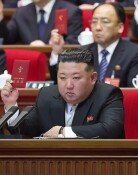[Opinion] Rummyism
Honest but straightforward, sometimes humorous--these are words that describe Secretary of Defense Donald Rumsfeld, who is famous for his peculiar rhetoric. His almost daily interviews on TV since the 9/11 attacks have enjoyed great popularity, and have been dubbed the Rummy Show. In addition to being confidence-building, the interviews given by this eloquent Rambo provide fun entertainment. Regarding the terrorist attacks, his remark that there are known knowns; there are known unknowns; there are also unknown unknowns, has become a popular quote. In the final analysis, it is puzzling but reasonable, sophist but intelligent and brilliant, and that is what people of the U.S. call Rummyism.
Rummyism finds its roots in the unbearably honest personality of Secretary Rumsfeld, as well as the agility he gained from his experience as a former wrestler, never letting a moment of advantage pass untaken. Other factors contributing to Rummyism are his competence as a two-time Secretary of Defense, his confidence in leading the worlds strongest nation, and his leadership which analyzes core issues and reacts spontaneously. He was even chosen as the Sexiest Man by the National Review, a conservative magazine, immediately following 9/11, although it is questioned whether he has lost the confidence of President George W. Bush since the stormy aftermath of the war in Iraq began.
Rummyism represents the real intentions of the Secretary of Defense better than any official statements. Missions come before anything else, declared Secretary Rumsfeld. However, he later exposed the paradox of the strong and his view that he can do anything for the U.S. by saying, In order for one to be fair, one has to get stronger first. This comment is in line with one of his remarks in an interview while visiting Korea, Weakness can make people do what they should not consider. This remark, along with his exclamation, My goodness gracious! in response to a question of a reporter, came as an expression of his disapproval of Koreas decision to deploy mainly non-combat troops.
It might be natural for Rumsfeld, as the Secretary of Defense, to believe that the U.S. can defeat its enemy with military power. However, the idea that it can dominate the world with its own perspective could be termed arrogance. For this reason, Rummyism has been the cause of many disputes. He has also upset Germany and France by dubbing them Old Europe, when they refused to cooperate with the war in Iraq. We must now watch and determine whether his declaring North Korea an evil and saying that dramatic political change might storm North Korea might bring about some kind of aftershock.
Editorial Writer Kim Soon-duk, yuri@donga.com







